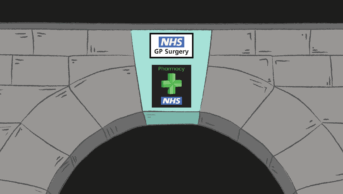
Shutterstock.com
Almost one-third of pharmacy owners in England have said they have had to stop providing some nationally commissioned services owing to financial and operational pressures, according to a poll carried out by Community Pharmacy England (CPE).
Of 92 pharmacy owners — representing 2,114 pharmacies — polled on the impact of ongoing pressures on pharmacy businesses, 30% said they had stopped providing some advanced services, including the new medicine service and vaccination services.
The results of the poll, which was conducted in June 2024, also revealed that 96% of the 92 pharmacy owners said they had stopped providing locally commissioned services in the past 12 months.
Locally commissioned services include emergency hormonal contraception provision, enhanced smoking cessation and other minor ailments services, which build on the Pharmacy First service.
Pharmacy owners also reported having to cut opening hours, with 81% of respondents saying that they had to stop offering extended opening hours.
In March 2024, analysis by The Pharmaceutical Journal of quarterly NHS figures on the pharmaceutical list showed more than a fifth of community pharmacies cut their opening hours between 2022 and 2023.
Then, in June 2024, analysis by the National Pharmacy Association revealed that just under two-thirds of pharmacies (63%) have reduced their opening hours between 2015 and 2024 as a result of funding cuts.
The CPE poll also revealed that 90% of pharmacy owners have had to stop employing locum pharmacists, while 23% have stopped free delivery of prescriptions to patients.
Respondents were also asked to rank a list of pressures on a scale from one to ten, with ten being the highest pressure. Pharmacy owners said that ‘unpredictable revenue stream’ was the most intense pressure, followed by ‘workforce costs’.
Commenting on the poll results, Janet Morrison, chief executive of CPE, said: “Across England, patients and local communities are paying the price of our collapsing community pharmacy network, as thousands of pharmacies have been left with no choice but to reduce the services that they can offer.
“These are not decisions that any pharmacy wants to make, but with a 30% real terms funding reduction and spiralling costs, pharmacy owners are having to make impossible decisions to try to keep their doors open.
“These latest findings once again confirm the deep distress that community pharmacies are in; more than 1,000 pharmacies that have been forced to close their doors permanently since 2016.
“Community pharmacies have so much going for them and they are doing more now than ever to support patients since the launch of the Pharmacy First service. But, without urgent help, they will not be able to do so for much longer.”
Nick Thayer, head of policy at the Company Chemists’ Association, said the findings were “concerning but unsurprising”.
“Unfortunately, continued underfunding has left pharmacy businesses between a rock and a hard place. The alarming loss of 1,200+ pharmacies since 2015 is evidence of this,” he said.
“We encourage pharmacy owners to continue to deliver the Pharmacy First service. Our analysis shows that the service has gotten off to a strong start and patients really value it,” he added.
“Furthermore, it is worth reminding ourselves that whilst we all agree that the ‘Community pharmacy contractual framework’ (CPCF) is in urgent need of an overhaul, Pharmacy First is funded outside of the CPCF.”
Also commenting on the poll, Nick Kaye, chair of the National Pharmacy Association, said: “It’s frustrating that pharmacies are being forced to retrench services rather than take on new challenges underpinned by fair funding. The government should be investing in us to reduce GP waiting times, but right now we are going backwards instead of fulfilling our potential as skilled clinicians”.


